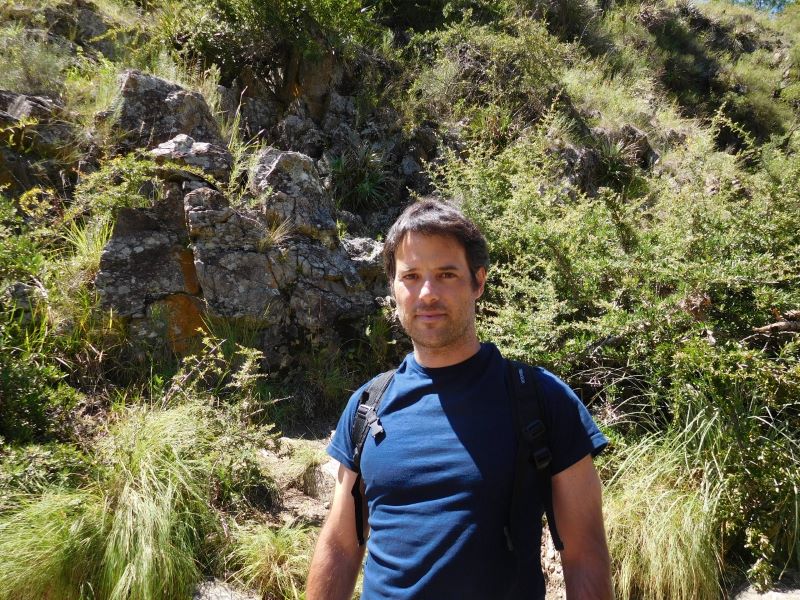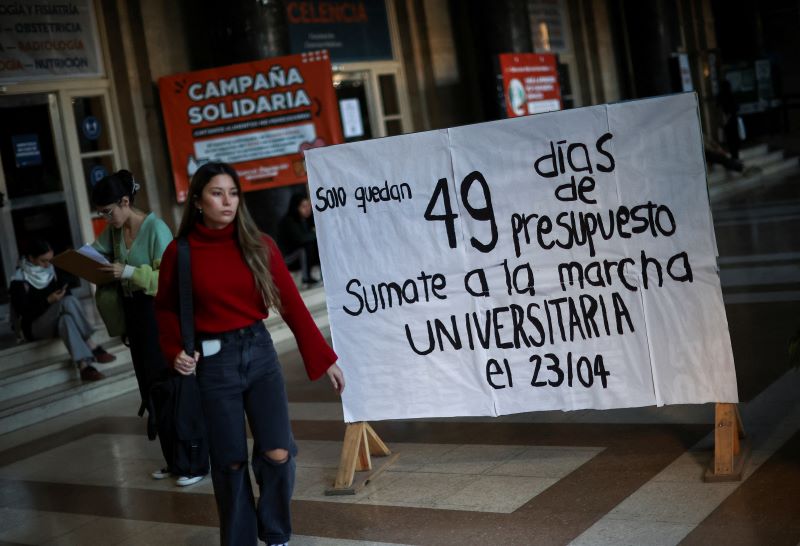Right-wing President Javier Milei has taken an axe to funding for education and scientific bodies, sparking fears for climate research
As a budget freeze for Argentina’s public universities amid soaring inflation leaves campuses unable to pay their electricity bills and climate science under threat, the country’s researchers and students are taking to the streets in a nationwide demonstration on Tuesday.
The dire outlook for Argentina’s renowned higher education system under President Javier Milei, a right-wing populist, was highlighted on April 22 – Earth Day – by Argentine plant ecologist Pedro Jaureguiberry, who was announced as a finalist in the prestigious Frontiers Planet Prize.
“The current budget for universities in 2024 is insufficient, adding to the fact that in recent years we have only received 20% of the budget we asked for conducting research at our lab,” Jaureguiberry, an assistant researcher with the Multidisciplinary Institute of Plant Biology at the National University of Córdoba (UNC), told Climate Home.
The 44-year-old scientist, who has spent his entire academic career in Argentina, was shortlisted for the award as one of 23 national champions drawn from science research teams across six continents, in recognition of a study he led on the drivers of human-caused biodiversity loss.

Dr Jaureguiberry conducting fieldwork in central western Argentina. (Photo: Diego Gurvich)
Of the finalists, three international winners will be announced in June in Switzerland, receiving prize money of $1.1 million each for their role in groundbreaking scientific research.
Global billionaires tax to fight climate change, hunger rises up political agenda
With annual inflation running close to 300%, this year’s freeze on Argentina’s government budget for universities and scientific research amounts to a spending cut in real terms of around 80%, according to the University of Buenos Aires, which this month declared itself in an “economic emergency”.
On Tuesday, university teaching staff and students, backed by trade unions, will march in Buenos Aires and other cities “in defence of public education”, which they say faces a grave threat from the budget squeeze.
Met office hit by layoffs
Argentine meteorologist Carolina Vera, former vice-chair of a key working group responsible for the latest assessment report from the Intergovernmental Panel on Climate Change, said that in four decades of teaching and research she had never seen “such a level of dismantling through the reduction of research grants and programs with such disdain for knowledge”.
“This is very serious for atmospheric and ocean sciences, key to issues such as climate change, placing a whole new generation of meteorologists and climatologists in danger,” she told Climate Home from Trevelin, in the southern province of Chubut.
There has been widespread condemnation of 86 layoffs affecting administrative and other contractors at the National Scientific and Technical Research Council (CONICET), while Vera added that she is concerned about the situation at the National Meteorological Service, where 73 technicians have been let go. That, she warned, would affect the functionality of early warning and disaster prevention systems.
Canadian minister vows to fight attempts to weaken plastic pollution treaty
Climatic and meteorological challenges are increasing in Argentina, from heavy rains due to the El Niño weather phenomenon – which has caused an ongoing dengue epidemic – to extreme heat and wildfires.
A significant drought is forecast for the southern hemisphere summer of 2024-2025, from November to February, as El Niño gives way to an expected La Niña, with the National Meteorological Service having a key role to play in predicting conditions and disseminating information about them ahead of time.
Vera added that the budget restrictions on CONICET would also limit its research capabilities, particularly relating to climate change. “We hope that this will be reversed soon,” she added.
Greenlight for extractive industries
Milei has branded climate change a “socialist lie” since 2021 and has also questioned public education for “brainwashing people” with Marxist ideology.
Sergio Federovisky, deputy minister of environment during the previous presidency of Alberto Fernández, said Milei is not only disdainful of scientific views on global warming but also on broader environmental protection. For example, Milei – a former university professor and television pundit – said during his presidential campaign that “a company can pollute a river all it wants”.
“Climate denialism is not a scientific position, but rather an argument used to release all types of extractive actions that could be hindered by an environmental policy on the use of natural resources and the concentration of wealth,” Federovisky told Climate Home from Buenos Aires.

Meeting between Argentine President Javier Milei and Elon Musk in Texas, United States, at the Tesla factory on April 12 2024, forging a partnership through which the government is betting on attracting investment to A
Read More

